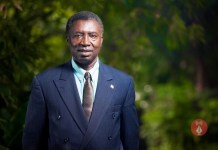Vice President Mahamudu Bawumia has already given a verdict on Ghana’s current extreme public debt situation, describing it as a Highly Indebted Middle Income Country (HIMIC). Hitherto, such a hopeless debt to Gross Domestic Product (GDP) ratio was dubbed Highly Indebted Poor Country (HIPC) following the debt relief of 2000 forced on Ghana.
Yet, appointees of the Akufo Addo administration are frantically spinning a rosy outlook for a Ghanaians economy that the International Monetary Fund (IMF) and World Bank (WB) are projecting to hit a debt to GDP ratio of 76% by the close of December 2020. Finance Minister Ken Ofori-Atta described the dangerous threshold as “mere statistics”, while Information Minister claims Ghana cannot be regarded as HIPC.
However, during the Distinguished Speaker Series on March 24, 2015, and while in opposition with Ghana’s debt to GDP hovering around 67%, the then running mate and economic guru of the New Patriotic Party (NPP), Dr. Bawumia said a debt ratio of 67 percent of GDP was in the same class as being categorised as HIPC by the IMF and WB.
“At 67% of GDP, Ghana’s debt stock has crossed the critical 60% of GDP level that developing countries with limited access to capital flows should worry about in terms of debt sustainability. In fact, Ghana is right back to the debt unsustainability that led to HIPC. However, HIPC debt relief will not be available again. Ghana’s status can thus best be described as that of a Highly Indebted Lower Middle Income Country (HIMIC),” Dr. Bawumia stated.
Despite Dr. Bawumia’s statement of the implications of high debt, the Akufo Addo administration has parried a seriously raging argument of whether Ghana has strayed into a HIPC status or not. The government claims it is not in HIPC.
In just four years, the Akufo Addo Administration alone has accumulated almost GHC 160 billion of the GHC 260 billion public debt of the country since its independence in 1957. The government has been strongly criticised for showing zero infrastructure investment from this accumulated debt.
Meanwhile, economic experts have dismissed the government’s assurance that Ghana is not within HIPC/HIMIC range. They conclude that the country is indeed in a HIPC status without officially being specifically being declared HIPC.
Professor John Gatsi, an Economics lecturer at the University of Cape Coast thinks Ghana is already in HIPC but without debt relief. He said: “Per the IMF’s more than 76% debt -to-GDP ratio with lower tax to GDP and rapid piling up of arrears with a reduced rate of access to water due to low investment and all year round pollution of water bodies, Ghana has thus been categorized as a HIPC country.”
Professor Gatsi clarified that “The only difference now is that there will not be any debt forgiveness and debt relief with conditions to invest in programs to reduce poverty. The first time HIPC was introduced, it was a package meant to support highly indebted poor countries experiencing acute poverty, social exclusion, and general poor and abandonment of infrastructure programs. It, therefore, came with support and benefits structured by the IMF& World bank.”
There is currently a nuanced play on semantics by the Akufo Addo administration as it tries to downplay the dire straits it has driven Ghana’s debt situation into after the Bretton Woods institutions issued a report that warned that Ghana has already crossed unsustainable debt levels.
In a report issued by the IMF on March 25, 2020, titled: “Debt Relief Under Heavily Indebted Poor Countries Initiative”, Ghana along 38 other countries were listed as “List of Countries That Have Qualified for or are Eligible or Potentially Eligible, and May Wish to Receive HIPC Initiative Assistance (As of February 2020)”.
Appointees of the NPP government refer to the fact that Ghana is not seeking debt relief under HIPC. However, on Tuesday, March 31, 2020, Finance Minister Ken Ofori-Atta Co-Chaired a meeting of African Finance Ministers in a virtual conference, where distressed countries were calling for massive debt relief from donor countries and agencies such as the IMF/WB.
Ken Ofori-Atta again repeated the same call for debt relief last week Friday, during a virtual planary session of the Development Committee of the World Bank and the IMF.
The desperate call for debt relief is Ofori-Atta’s last assignment as the Chairman of the Development Committee, as he called for an extension of the Debt Service Suspension Initiative (DSSI) introduced by the G20 for vulnerable countries. The DSSI is effectively a glorified HIPC initiative.
Ofori Atta’s call is under the guise of a supposed effect of COVID-19 spendings of these vulnerable countries. Yet, Whatsup News can report the wasteful COVID-19 expenditure embarked upon by the Akufo Addo administration of Ghana.
For instance, the government designed a GHC 10 million insurance package for frontline health workers fighting against COVID-19, yet, some GHC 2.4 million from that amount was pocketed by the Finance Ministers private insurance company and its ghost front as fees for brokering the insurance deal.
The government also, claimed it distributed free food, but it turned out to have been given to a few political party loyalists.
The government is Officials are piling the blame on the COVID-19 pandemic. However, the government was under serious criticism for its overspending way before the pandemic hit internationally.









